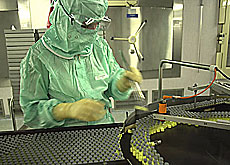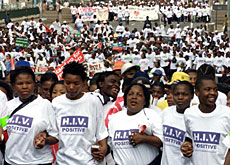Roche posts record loss

Swiss pharmaceuticals group Roche has posted a record net loss of SFr4.03 billion ($2.97 billion) loss for 2002.
A series of heavy one-off charges relating to its vitamins operations, lower financial income and the strong Swiss franc dragged down the company’s results.
The loss, the worst in Roche’s 107-year history, compares with a 2001 profit of SFr3.7 billion.
But Roche, which is notorious for its complicated results, said performance had been strong, particularly in its core businesses of pharma and diagnostics.
Group sales rose by eight per cent in local currency terms (two per cent in Swiss francs), from SFr29.163 billion in 2001 to SFr29.575 billion last year.
Announcing the figures on Wednesday, Roche said that excluding special items, operating profit had increased by 22 per cent in local currencies (12 per cent in Swiss francs) to almost SFr5 billion.
The board said it would be increasing the dividend by 12 per cent, to SFr1.45 in 2002.
Commenting on the full-year results, Roche chairman and CEO Franz Humer said the group had been hit by two very different developments.
“While our core pharmaceuticals and diagnostics divisions performed strongly, posting above-market growth rates and further increases in profitability, vigorous action to address significant unresolved issues from the past resulted in the group reporting a substantial loss,” he said.
Bitter pill
The company’s net income, excluding special items, also took a dive, dropping 17 per cent to SFr3.808 billion.
Roche blamed the slump on higher taxes and lower gains from equity investments, as a result of weak financial markets.
The company had to set aside SFr1.77 billion to settle vitamins price-fixing lawsuits, pay a SFr1.65 billion impairment charge related to the sale of its vitamins business to DSM, and find SFr778 million to settle a licensing dispute in the United States.
The full-year loss was in line with expectations and followed a 28 per cent fall in first-half profit to SFr1.8 billion.
Heavy losses
The Basel-based healthcare group, which has a huge portfolio of financial investments, recorded a SFr5.19 billion writedown for unrealised losses on its holdings – much worse than analysts had expected.
“But it does clear the decks,” said Paul Diggle, an analyst at WestLB Panmure in London.
“Looking forward, with that millstone no longer round their necks and with more clarity about what the financial line will look like in the future, investors may feel a bit more confident about the stock.”
Roche said operating margins were expected to improve, and sales at its pharmaceutical and diagnostics businesses would rise at double-digit rates this year.
High hopes
The launch of new products is expected to fuel the growth in sales.
In particular, Roche is pinning its hopes on hepatitis drug Pegasys, which was approved last year, and new HIV treatment Fuzeon, which is due to be approved shortly.
Roche has forecast that annual sales of Pegasys could reach SFr1.5 billion, with Fuzeon earning up to SFr1 billion annually.
The company on Tuesday priced Fuzeon, also known as T-20, at a record-breaking €18,980 (SFr27,870) a year – more than double the cost of other HIV/Aids drugs on the market.
Roche hopes the new drugs will revive its flagging fortunes and help it rebuff merger approaches from Swiss rival Novartis.
Novartis announced last month that it had paid $2.1 billion to increase its voting stake in Roche from 21.3 per cent to 32.7 per cent.
It is now just half a per cent short of the one-third threshold for triggering a mandatory public offer.
Future unclear
Patrick Burgermeister, a pharmaceuticals analyst at the Zurich cantonal bank, told swissinfo that Roche had succeeded in clearing many uncertainties.
However, he warned that Roche may have already lost another SFr400 million on its stock-market investments since January.
Roche maintains an investment portfolio with almost SFr8.3 billion tied up equities.
“In the 90s, Roche profited so much from the rising markets, they now suffer from this policy [and] they can’t get out of their investments without incurring high losses,” Burgermeister says.
“They will need at least two years to change that strategy.”
Burgermeister adds that markets remain concerned by the fact Roche has not issued detailed information about its earnings expectations for 2003.
“We don’t have clear guidance on 2003,” he says.
“I also get the impression that their drug pipe-line is a little bit worse [than expected].”
Roche has cut the number of drugs it hopes to launch on the US market in 2005 from five to three.
Novartis
In an interview on Wednesday with the weekly “HandelsZeitung” newspaper, chairman and CEO Daniel Vasella said Novartis would be holding on to its Roche stake for the “foreseeable future”.
“I see this as a very long-term, strategically important investment. We have taken a correct and important step,” he said.
Vasella said Novartis did not intend to increase its voting stake, saying his firm was content to hold a blocking minority that could give it a say in important strategic decisions at Roche.
He again reiterated that a merger with Roche was in the interests of both companies and would create a global powerhouse in pharmaceuticals, diagnostics, generics and non-prescription drugs.
“We would have the leading global position in medicines,” said Vasella. “As far as innovation goes, our areas are complementary.”
Roche CEO Franz Humer told journalists that a merger was out of the question and he scoffed at claims that Novartis’s voting stake would allow it to influence strategic decisions.
“We have complete freedom to continue our strategic aims,” he said.
swissinfo with agencies
Pharmaceuticals giant Roche posted a record net loss for last year, but the company is forecasting a bright 2003, buoyed by double-digit sales.
Roche is pinning its hopes on the launch of a number of new products.
Expensive lawsuits and a multi-billion franc decrease in the value of its equity portfolio lay at the root of the poor results.
But analysts believe Roche has now “cleared the decks” and can move ahead. Investors responded on Wednesday by driving up the share price by more than five per cent.
Roche employs more than 60,000 people.
It sells its products in over 150 countries.
The group’s headquarters are in Basel.
Roche made a net profit of SFr3.7 billion ($2.72 billion) in 2001.

In compliance with the JTI standards
More: SWI swissinfo.ch certified by the Journalism Trust Initiative



You can find an overview of ongoing debates with our journalists here. Please join us!
If you want to start a conversation about a topic raised in this article or want to report factual errors, email us at english@swissinfo.ch.